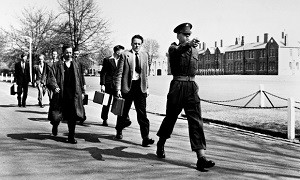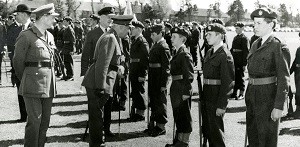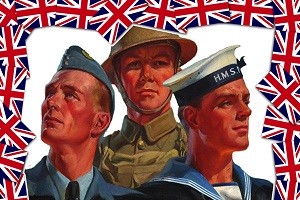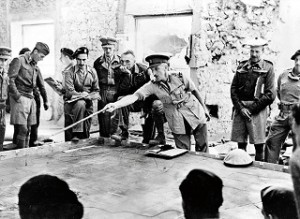The important (only) thing is getting there
Yesterday I attended a military services reunion function with my father – as, it were, his ‘wingman’ and supporter. In all honesty, I had no personal right to be there, my sole connection with matters military being confined to unwilling participation in my school’s combined cadet force – which in my day, half a century ago, was compulsory in the sixth form.
I should say that of the dozen or so people present (discounting wives for this purpose), most were aged between 70 and 85, although one still-hearty individual was introduced to me as being about to turn 98 in a few weeks.
In my experience a characteristic of those who have experienced military service tends to be a significant degree of ‘get up and go’ in their general approach to life.
 I’m not naturally inclined to be in the camp that advocates what whole swathes of typical British slovenly, work-shy, disaffected, petty criminal, probably drug-addled teenagers and/or young adults desperately need is the return of National Service, perhaps in an updated 21st Century form, but I do feel there may be something worth considering under this broad heading.
I’m not naturally inclined to be in the camp that advocates what whole swathes of typical British slovenly, work-shy, disaffected, petty criminal, probably drug-addled teenagers and/or young adults desperately need is the return of National Service, perhaps in an updated 21st Century form, but I do feel there may be something worth considering under this broad heading.
Choosing my words carefully here lest I come across all Nigel Farage and/or Big Brother, there seems a certain logic in the notion that young men (and young women for that matter) need to progress from ‘wherever they might be on the cusp of adulthood’ into grown-ups who wake up, ‘get a grip’ and then accept responsibility for making of their lives what their natural potential and sense of ambition – added to a degree of straightforward hard-graft application, of course – will allow.
Occasionally I have come across young men who seem aimless, if not temporarily devoid of any sense of purpose, who tend to spend their days sleeping until noon, refusing to lift their finger to contribute anything to any enterprise worthy of being undertaken by anyone.
Hands up up all those who haven’t from time to time harboured the notion that this state of tiresome feckless ennui in someone they know might have been cured by six months or so of compulsory cold baths at first light, obeying of (sometimes mindless) orders, five mile runs, physical jerks, square-bashing until the cows come home and being shouted at endlessly by former military NCOs …
It seems to me that, broadly-speaking, there are three categories of people in this world.
 Firstly, those lucky enough to possess a strong instinctive sense of purpose, an ability to set themselves goals and a strong determination to achieve them.
Firstly, those lucky enough to possess a strong instinctive sense of purpose, an ability to set themselves goals and a strong determination to achieve them.
Secondly, those who don’t possess these – or at least, not to the same degree – who nevertheless can be encouraged (I didn’t want to say ‘indoctrinated’) by dint of a programme of enforced (self) discipline, cajoling, persuasion and ‘being cruel to be kind’ into acquiring a similar set of skills and attitudes with which to go forward in life.
On the theory that, in the final analysis ‘the end justifies the means’, the argument woulds run that it is worth putting this second group through the relevant mincer in order to turn out chaps who can pass muster alongside those in the first category.
And thirdly, the also-rans – i.e. those who do not have the wherewithal or potential to belong to either of the above categories – who are going to end up as life’s losers. They might argue this is because they never had a chance, or were never ‘given a fair go’, but the push-back response to that is that (ultimately) every positive attitude and indeed lifestyle turn-around has to come from ‘within’.
In this life nobody – well very few indeed – ever achieve huge success (whatever than means) and/or luxurious comfort by having these presented to them on a plate. Especially not as a matter of entitlement – as in, ‘It’s my basic human right to have a house, a home, a car, a smartphone, a Sky Sports TV package, three holidays per year in the sunny Mediterranean and £300 cash in my wallet every week for sundry expenditure … and it is your – or someone in authority’s – job to provide me with all these gratis.”
To be fair, I don’t doubt that in every person’s young life there are times when they ‘lose their way’, get confused about what career path they want to pursue in life, become down in the dumps about their lack of a girlfriend – or the right sort of girlfriend – and generally experience the odd trough or two.
These are a totally natural and understandable phenomenon and I’m happy to admit to having had one or two of them myself. In my case they were almost certainly a product of loving my school environment as much as I did, most particularly the certainties of nearly everything including how that little safe and protected world ‘worked’, and then suddenly finding myself pitched out into the wide, wonderful world in which anybody could literally choose to do anything – or indeed nothing – and the irony (and frightening aspect) of it was that it was you, and you alone, who had to make that choice, or choices, for yourself.
 Perhaps the strangest aspect of all this – as I discussed with a couple of my fellow guests yesterday – is/was that, contrary to one’s conviction at the time one is supposedly making the choices that will determine the course of one’s life, the bottom line is that it doesn’t really matter what choices we make in this respect because – the truth will out – most of us could/will always make a half decent fist of whatever we end up doing.
Perhaps the strangest aspect of all this – as I discussed with a couple of my fellow guests yesterday – is/was that, contrary to one’s conviction at the time one is supposedly making the choices that will determine the course of one’s life, the bottom line is that it doesn’t really matter what choices we make in this respect because – the truth will out – most of us could/will always make a half decent fist of whatever we end up doing.
No. The key thing about a career choice is not necessarily whether it is going to be ‘right’ or ‘wrong’ for us (as we all tend to think) but that we have made a choice at all – and then stuck to it, i.e. followed it through with ambition, graft and drive.
Whether it turns out to be running a dental practice, a corner shop, the NHS or the Tesco’s Group (to list but four) doesn’t really matter. The same issues always come up in every walk of life, only perhaps in different contexts and degrees of scale.
That’s why yesterday I found what these military chaps did after quitting the military so fascinating.
 Whether they’d become school bursars, flight simulation consultants, publicans or indeed anything else you’d care to imagine – they’d simply applied their military, ever practical approach (“What’s the issue? What are we trying to achieve? What supplies do we need to achieve it? Where do we get those from? How many people, with which skills, will we need? What obstacles or difficulties might prevent us achieving it – and how do we neutralise or get around those? And so on …) to the new walk of life they’d become involved with. And just got on with it. Because that is what military-trained people do.
Whether they’d become school bursars, flight simulation consultants, publicans or indeed anything else you’d care to imagine – they’d simply applied their military, ever practical approach (“What’s the issue? What are we trying to achieve? What supplies do we need to achieve it? Where do we get those from? How many people, with which skills, will we need? What obstacles or difficulties might prevent us achieving it – and how do we neutralise or get around those? And so on …) to the new walk of life they’d become involved with. And just got on with it. Because that is what military-trained people do.
One chap I spent half an hour with yesterday was 80 years of age and had just retired from being a local councillor, chairman of two charities, on the governing body of a hospital and running his own management consultancy. He made me weary just hearing him list all his worthwhile activities. When I compared what he’d been doing (since quitting his main career and returning to Civvy Street) to what insignificant dribs and dabbles I’ve undertaken since leaving mine, I felt a tsunami of inferiority and sloth crash over me.
Still, there’s no point in crying over spilled milk. I’ve done what little I’ve done with my life and anyway tomorrow will be another day …

